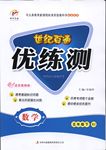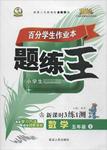题目内容
Over the last few years, the number of students participating in volunteer programs _______ sharply in our school.
A. was increasing B. has increased
C. had increased D. increased
B
【解析】
试题分析:句意:在过去几年里,我们学校参加志愿者活动的学生的数量急剧上升。A. was increasing过去进行时;B. has increased现在完成时;C. had increased过去完成时; D. increased一般过去时。Over the last few years是现在完成时的标志词,所以选B。
考点:考查动词时态的用法。

 世纪百通主体课堂小学课时同步达标系列答案
世纪百通主体课堂小学课时同步达标系列答案 世纪百通优练测系列答案
世纪百通优练测系列答案 百分学生作业本题练王系列答案
百分学生作业本题练王系列答案Why can’t some hard-working people learn well? The reason is that they don’t have a good way to learn.__ 1.____,you would learn better.
First ,you should preview before class and you will find some difficult points you can’t understand._ 2.___.If you still can’t understand ,you could discuss them with your classmates or ask your teacher for help untill you understand them very well.
__3._,you should do an important thing-----That is revision. Revision is very important. It can help you consolidate(巩固) what you have learned. If you don’t review at all, as time goes by and you will forget what you have ever learned.
Another thing is open your eyes and mind. ___4._. You can read some literature to improve your language skills and you can also read some books on science to enrich your knowledge of science.
Of course, there are some other good learning ways and we should share them together.
In a word, if you want to learn better, you should learn to preview and review first, and open your eyes as well.
A. Then, you could pay more attention to the teacher’s explanations of them B. Reading can help C. If you have a good way to learn D. After you finish your homework at night E. Travelling is a good way |